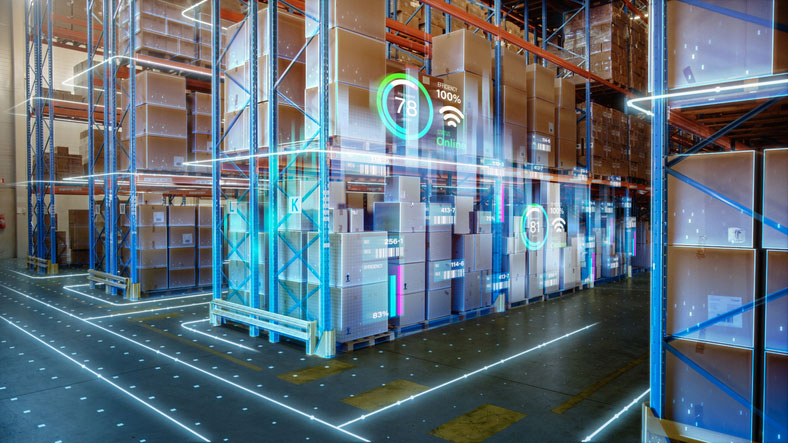Written by Scott Wilson
Digital supply chain management is the practice of using digital tools to oversee, evaluate, and manage supply chain processes. Enabled by new, advanced technologies, digitization offers greater visibility, responsiveness, and control throughout the logistics train.

Like other parts of the modern world, the supply chain has been completely transformed by digital technology.
Digital technology is so ubiquitous in modern life that few people spend much time thinking about what it represents.
Digital refers to the practice of storing and transmitting information in the form of binary signals, ones and zeros that can be easily read and processed by computers.
It’s contrasted with analog, a squishier, linear measurement and storage method. The innovative thing about digitization is the speed and flexibility of computation. Throw enough ones and zeros into a computer, and you can get the entire inventory warehouse records for a decade. Shuffle those digits around in the right way, you can instantly see what products are moving quickly and what are stalled on the shelves for months.
What’s more, you can do that from half a world away. No one has to wander down the aisle for a look. Other new devices can send those ones and zeros from tags right on the products. They feed digital data to ERP (Enterprise Resource Planning) systems that departments as varied as marketing and accounting can use to fuel their daily tasks.
That’s a huge difference from the old days, where stock records might have been recorded by hand, duplicated with carbon paper, and sent by mail to head offices only to arrive weeks or months later.
Digital Supply Chain Management Is Both Old News and the Hot New Thing

If this all sounds basic to you, it is. Digital technology, from the humble spreadsheet to a global ERP database, is just table stakes in modern supply chain management.
Everyone is using digital supply chain management. The only question left today is which companies will use it most effectively to create a competitive advantage.
Basic doesn’t mean unimportant. Digitization has created incredible new opportunities. But it’s also enormously complex. Understanding how an ERP system absorbs, digests, and spits out data is a world apart from understanding basic paper records. Supply chain professionals today need technical skills that didn’t even exist twenty years ago. The bar is higher now, across the industry.
It’s going to get higher yet. Because digital supply chain management isn’t done transforming what is possible in the field.
A Look at Some of the Advantages Brought by Digitizing the Supply Chain

Supply chain digitization has been going on for long enough that the essential advantages are clear. It offers supply chain professionals advantages such as:
- Increased visibility into supply chain operations and performance
- Better communication with far-flung team members and vendors
- Faster and more accurate data collection
- Improved reporting abilities for decision-making
- More responsive controls for product flow and production
- Easier and faster handling of procurement and distribution orders
But the killer feature of digital supply chain management is that it opens the door to even more features. Having put the basic digital tools in place, those ones and zeros can easily turn into advantages that are still unimagined… until the right expert comes along with a new idea. Ideas like:
- Warehouse automation - Warehouse Management Systems (WMS) provide a digital model of real-world storage sites. That representation can be used to test efficiencies from reshuffling placements, routing transport more efficiently, or identifying control systems that automate those movements entirely.
- Big data - Big data analysis brings together digital information from a wide range of sources, sensors, and records to uncover trends that might otherwise never be discovered. Tracking data from a delivery van can be mashed up with digital weather records, traffic sensors, and even satellite imagery to find better route timing and reliability in deliveries.
- Quality control - Digitizing quality management processes provide faster exposure of quality issues and an easier path to finding root problems. With large volumes of information about product quality and production in digital form, software can surface manufacturing or shipping defects fast and trace them quickly to their source… tasks that might take on-the-ground inspectors weeks or months to achieve.
- Supply chain resilience - The flexibility that comes with digitization enables multiple pathways, diverse routing, and easily-shifted base locations. That all adds up to resiliency, giving partners multiple points of access and the ability to adjust on the fly.
The future holds even more promise for digital supply chain management. Breakthroughs in machine learning and artificial intelligence work natively in digital systems. Organizations that have already migrated their operations to digital platforms will find new opportunities for plug-and-play innovation from such systems.
In many cases, these are innovations that combine digital and physical technologies. In that sense, they are systems that couldn’t exist without both. That means that supply chain managers must become equally skilled in both the traditional SCM and digital SCM worlds.
College Courses Can Unpack the Secrets of Digital Supply Chain Management

These are all complex systems. They may start out from a creative idea sketched on the back of a napkin, but turning them into real, working processes requires more than just an idea: strong foundational knowledge in digital supply chain management is essential.
Supply chain management degree programs are keeping up with that need by building in more and more training specific to digital applications. You’re likely to find classes like:
- Contemporary Supply Chain Technology
- Supply Chain Analytics
- ERP systems
- Blockchain Applications in the Supply Chain
Each round out overall competencies in standard supply chain functions like procurement, transport, and storage with the specific digital tools used to accomplish those tasks.
There are also degrees that are very specialized, such as the Master of Science in Digital Supply Chain Management. With additional coursework in areas like data mining, analytics optimization, and statistics, they extend the digital capabilities supply chain managers use on the job. Cyber supply chain risk management, machine learning, and data storage considerations that are particularly useful in digital SCM are also covered.
As with many areas in which digital technology has made its mark, it won’t be long before digital supply chain management is simply regular supply chain management. But at the pace with which digital technology advances, maintaining a solid command of the concepts and tools will become the baseline expectation for supply chain managers.







